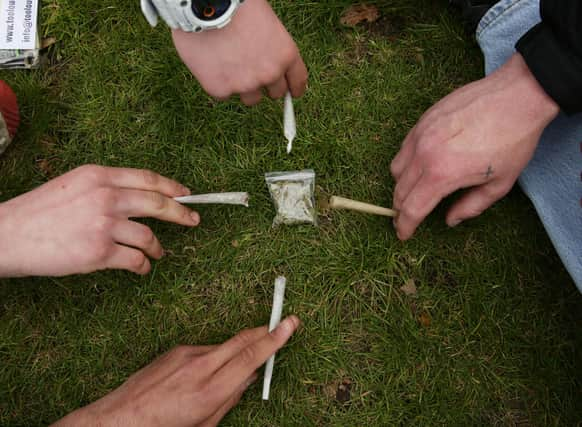Lincolnshire children commit hundreds of drug crimes in less than a decade


Children have committed hundreds of drug crimes in Lincolnshire in less than a decade, figures show.
Thousands of child drug offences are recorded by police every year in England and Wales – but critics of drug prohibition warn giving a youngster a criminal record can negatively impact their future.
Advertisement
Hide AdAdvertisement
Hide AdMinistry of Justice figures show 15 cautions or convictions were handed down to youngsters in Lincolnshire over drug crimes in 2020-21, with the punishments among 238 recorded since records began in 2013-14.
Since then, under-18s across England and Wales have been cautioned or convicted over drugs almost 48,000 times – punishments that could have life-long consequences, according to campaigners calling for reform.
Nationally, 4,000 drug offences were committed by children during the first year of the coronavirus pandemic, despite national lockdowns and other measures contributing to a significant fall in overall crime rates.
It meant 10.3% of all childhood offending in England and Wales was connected to drugs in 2020-21 – the highest proportion on record, despite a 58% drop in youth-related crime since 2013-14.
Advertisement
Hide AdAdvertisement
Hide AdAcross the area covered by the Police and Crime Commissioner for Lincolnshire, drug crimes represented 4% of the total 351 proven offences that resulted in a conviction or caution for children last year.
Steve Rolles, senior policy analyst at the Transform Drug Policy Foundation, said the figures were a "depressing reflection on the failure of UK drug policy" and added that nobody should be criminalised for personal drug use.
He said a prohibitionist approach had gifted the control of drug markets to organised criminals, adding: "Rather than protecting children, the war on drugs has put them in harm's way, through criminalisation, more potent and risky drugs and through the exploitation of vulnerable youth within illegal drug supply networks and county lines."
A Government spokesperson said it was combining tough enforcement with early intervention programmes and investing £200m in its Youth Endowment Fund to divert children from crime.
Advertisement
Hide AdAdvertisement
Hide AdIt is establishing an evidence base to better understand how to prevent children from taking drugs but has no plans to decriminalise drug possession, saying it would not eliminate the crime or address the harms associated with drug dependence.
Dr Laura Garius of Release, the national centre for drugs expertise, called prohibition a gateway into further drug use and offending, adding: "There is no relationship between the toughness of a country's drug sanctions and the levels of drug use.
"Criminalising children for drug offences hinders their life chances and disrupts their education and employment outcomes.
A 2018 NHS report found that a quarter of 11 to 15-year-olds surveyed in England that year said they had taken drugs, including 38% of 15-year-olds.
Advertisement
Hide AdAdvertisement
Hide AdAnd separate figures show concerns over a child's misuse of drugs was a factor in 27,000 assessments of children in need across England in 2020-21.
Commander Catherine Roper, lead for children and young people at the National Police Chiefs Council, welcomed the national reduction in recorded child crime over recent years.
She said there would always be situations in which arrest is the best option but said forces give "careful consideration" to all options and often take a diversionary or restorative approach with the aim of preventing further offending.